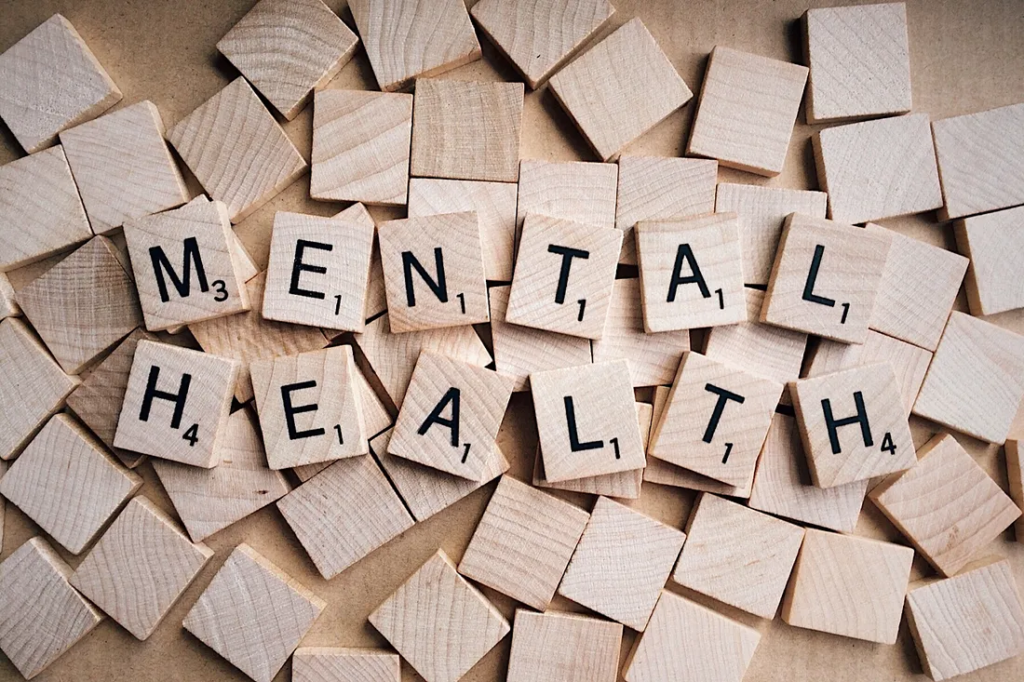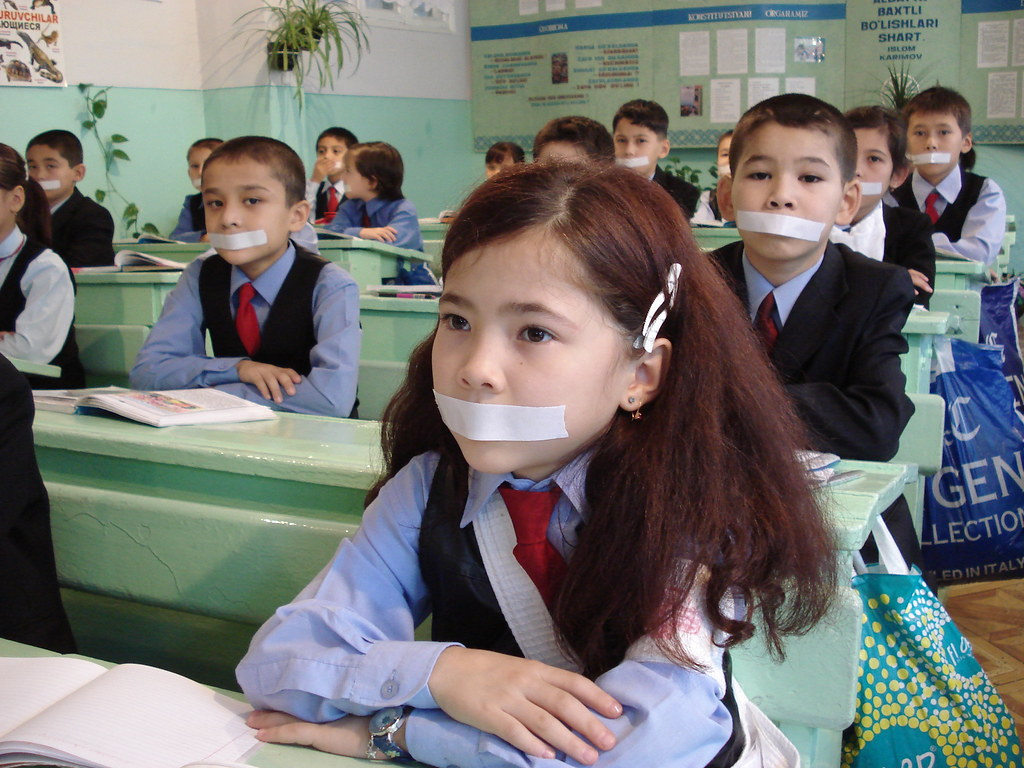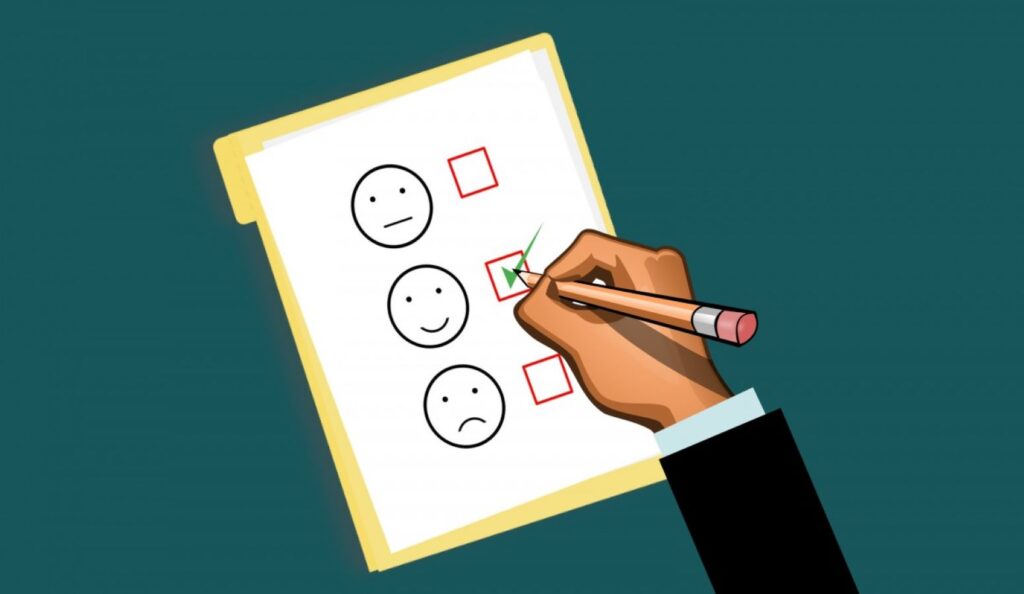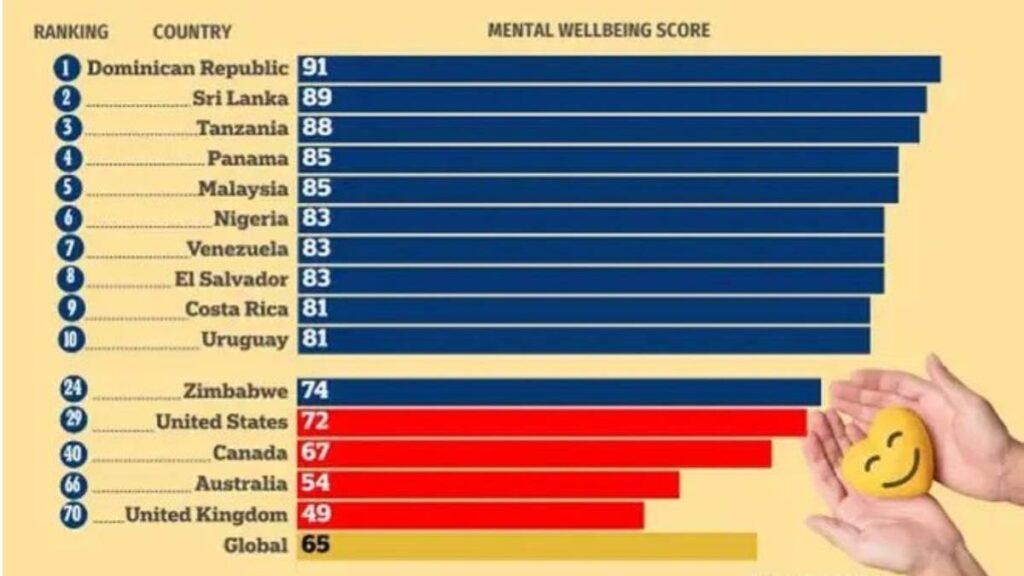The study in question adopted a numeric scale to assess the mental well-being of different countries worldwide. The results are astounding.

The United States had an average score of 72, the United Kingdom and Australia polled 49 and 54, respectively. On the contrary, Nigeria had an average score of 83. To give more perspective to these results, and what they mean, keep reading as we explain how scientists generated it and what it means.
Lab Rats for Assessing Mental Wellness
The United States will here serve as a representative sample of developed economies, so we shall make multiple comparisons to its score on the mental well-being scale.

The global report was aimed at determining how much people ‘worry’ in different parts of the world. It subsequently reveals that residents of Armenia, El Salvador and Zimbabwe are less miserable when compared to Americans.
How Did They Do It?
The researchers assessed their subjects based on metrics like self-esteem, outlook on life and mood. The study polled research subjects from 71 countries, after adding 11 more in 2023.

The US came in 29th, Canada 40th, and the United Kingdom at 70th. In contrast, impoverished nations of Latin America and Africa ranked highly on the list. For example, Tanzania came in third, while the Dominican Republic was first.
A Nonprofit With Several Tentacles
The study was conducted by researchers at the Sapiens Labs, a nonprofit organization. The researchers discovered that the mental health of the average Westerner has not been the same since after the recent pandemic.

However, these researchers believe there are several other notable causes of the decline in mental health scores of residents in affluent countries.
What Impacts Our Mental Wellness
Sapiens Labs researchers affirm that factors like the proliferation of remote work, disintegration of the family unit, subsistence on junk foods, and smartphone addictions in affluent countries are some of the overlapping factors that led to the observed decline in mental well-being.

According to the researchers, it is high time we “understand the drivers of our collective mental wellbeing” and make active efforts to improve it.
The Older You Are, the Lesser Your Misery
The study assessed the mental health quotient (MHQ) of people in different age groups in English-speaking countries of the West. It found that baby boomers had it together relative to younger folks (Millenials and Gen Zs) who experienced a sharp decline after the pandemic.

The study assessed over 50,000 research subjects in 71 representative countries.
The MHQ Assessment Survey
Researchers at Sapiens Labs developed a standard definition of mental well-being: “the ability of an individual to handle the normal stresses and adversities of life and contribute productively to society.”

The MHQ assessment was conducted through an anonymous online survey. The survey assessed respondents’ emotional and cognitive capabilities while equally noting their key lifestyle and demographic markers.
The MHQ Scale
The DMQ assessment survey is based on a metric scale that runs from – 100 to 200. When the score falls below zero, it indicates extreme distress to mental wellness. 0 to 50 means enduring, while 100 to 200 is good and thriving.

The average global MHQ score was found to be 65 in 2023.
Struggling and Thriving Nations
After analyzing the survey data, Sapiens Labs scientists found that 38% of the respondents were thriving, while 27% were distressed or struggling. The top five countries atop the mental wellness list are the Dominican Republic, Sri Lanka, Tanzania, Panama, and Malaysia.

After that, we shall share the researcher’s deductions about how these five countries came top.
Most Healthy Country to Live In
Sapiens Labs’ submission on the Dominican Republic, which came first on the wellness list, is that the country has a leisurely and simple lifestyle ingrained into its culture.

The Dominican Republic generates a large chunk of its annual income from the tourism industry. So, for most residents, work and everyday life are like vacations.
El Salvador, Honduras and Sri Lanka
Sri Lanka is an Asian country that maintains a rich culture and values filial integration; this contributes to their high score on mental well-being.

Many of the asylum seekers dotting the streets of the US are from El Salvador and Honduras. Interestingly, these two countries are among the top 15 on the mental wellness list. The researchers believe this is because the study scope did not cover financial status.
The Five Most Miserable States
At the bottom rung of the list are countries like Tajikistan, Brazil, South Africa, the UK, and Uzbekistan. The study found Uzbekistan to be the most miserable country of the 71 countries.

The US Department of State has flagged Uzbekistan as an authoritarian state, thanks to the religious persecution and inability of residents to enjoy the benefit of basic civil rights.
Wealth and Mental Wellness Have a Negative Relationship
Also, researchers at Sapiens Labs found that national wealth indicators like per capita income and GDP are negatively correlated to mental wellness.

By implication, countries with the highest average wealth margin also exhibit a low MHQ. Likewise, many English-speaking countries saw an eight percent (24 MHQ points) decline in MHQ averages between 2019 and 2021, the high-impact period of the COVID-19 pandemic.
How the COVID-19 Lockdown Impacted Mental Wellness
In 2021, these countries experienced another three percent decline (8 MHQ points). Sapiens Labs suggest that this decline was probably due to the social restrictions of the COVID-19 lockdown.

However, the researchers noticed that since 2021, the global changes in MHQ averages have been insignificant. By implication, nations that fell into the distressed or struggling MHQ categories have not recovered since the decline.
Younger People Had a Relatively Higher Incidence of Mental Crisis
Another trend that the study observed across all 71 countries is that folks in younger age groups scored way lower on the MHQ than older people.

The researcher also correlated MHQ differences across different age groups to internet usage, suggesting that the prevalence of social media use among the younger generations may be responsible for their lower MHQ score.
Western Nations With Low MHQ Scores
Reviewing the average MHQ score of three prosperous nations of the West further reveals the negative relationship between national wealth and mental wellness.

As of 2023, the United States has an MHQ score of 72, ranking 29th on the mental wellness list. Canada scored 67, ranking 40th, while the United Kingdom scored 49, ranking second from behind.
How Smartphone Usage Affects Mental Wellness
The first factor spotlighted by researchers as responsible for the low MHQ score in Western countries is the age at which children gain access to their first smartphone.

In some of these affluent nations, children start using smartphones as early as age six. Meanwhile, the survey responses also reveal that the earlier a child starts using a smartphone, the lower their MHQ score is in adulthood.
Protect Your Kids From Depression by Holding Off On Handing Them a Smartphone
Still, on smartphone usage, the study found that respondents in countries with the highest MHQ scores started using their first device at a much older age.

For example, the average Latin American starts using smartphones at 14/15, and Africans at 16. In contrast, the average resident of the UK and US start using a smartphone at 11.
What Goes Into the Bowel Impacts Your Mental Health
The study also found that eating habits are also culpable in the cross-country variations in mental wellness. Less developed countries seldom possess the economic capacity to produce ultra-processed food locally. Most of their processed foods are imported or processed locally by multinationals, making them expensive.

So, the inability of most people in less developed countries to afford ultra-processed food is a blessing in disguise.
Why You Need to Cut Down On Ultra-processed Food
The Sapiens Labs research discovered that the frequent consumption of ultra-processed food often translated to a decline in mental well-being.

Unfortunately, 60 – 70% of the food consumed in developed economies like the UK and the US is ultra-processed. According to the research findings up to 50% of regular consumers of ultra-processed foods are susceptible to poor mental wellness.
Interdependence of Multiple Domains of Wellness
For countries where people only take ultra-processed food occasionally, maybe as a treat, only 18% show signs of struggle or distress with their mental health.

The next factor that Sapiens Labs identified to impact mental wellness is filial dynamics. Families in less developed countries are close-knit and maintain regular contact, even in adulthood.
Filial Relationships Are Also Culpable
On the contrary, data from respondents from wealthier countries, like the UK and the US, indicates they experience the least closeness to their adult members. Likewise, this set of people also experienced the highest instances of family instability during their childhood.

Overall, the research result concluded that adult who maintain close relationships with their relatives are four times less likely to develop mental health issues.
Divorce Can Also Be Responsible for Mental Health Risks
In addition, several other studies agree that children who were raised by single parents or were forced to shuttle between separated parents are susceptible to leading dysfunctional lives in adulthood.

Unfortunately, divorce is common in Western and affluent countries, so much so that they have lawyers whose specialty is to get the best settlements for their clients during a divorce case. In less developed economies, divorce is not a norm.
Some Research Limitations
While highlighting the steps towards conducting this study as efficiently as possible, the researcher identified some notable limitations in the methods. One, the survey was only administered online, so only countries with widespread access to the internet could participate.

This partly explains why the study covers 71 countries. So, this result cannot represent or apply to the entire global population.
The Research Is Not Entirely Perfect
Likewise, the chief scientist and founder of Sapiens Labs, Dr. Tara Thiagarajan, clarifies another potential bottleneck in the methods of data collection.

Thiagarajan mentioned that the survey was only available to residents of less developed countries who had internet access. Internet access can be a luxury in such parts of the world, meaning such respondents may not be representative of the average resident in a less developed country.

